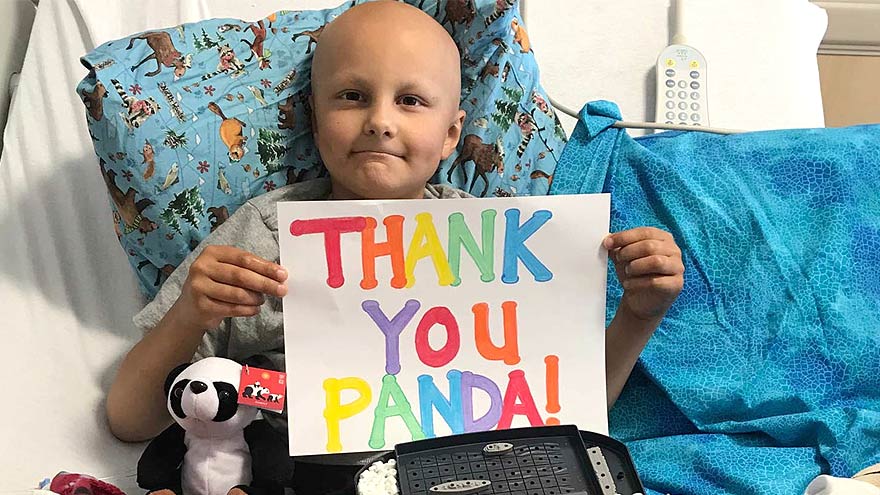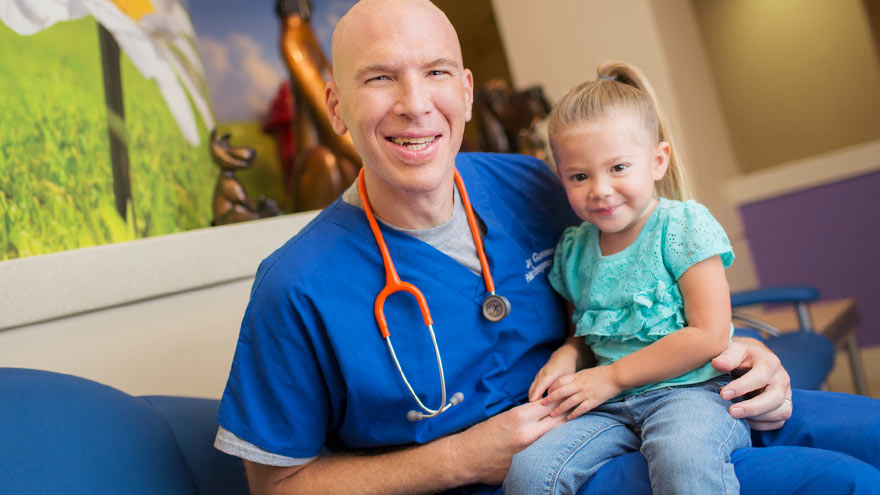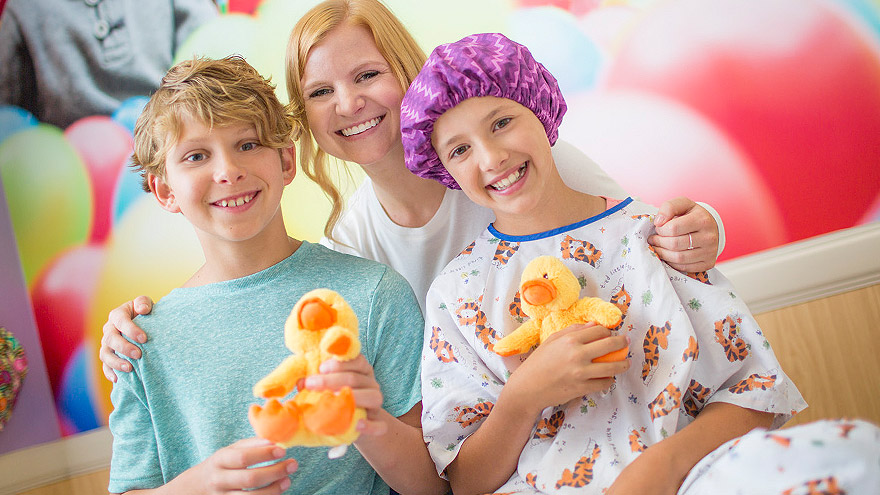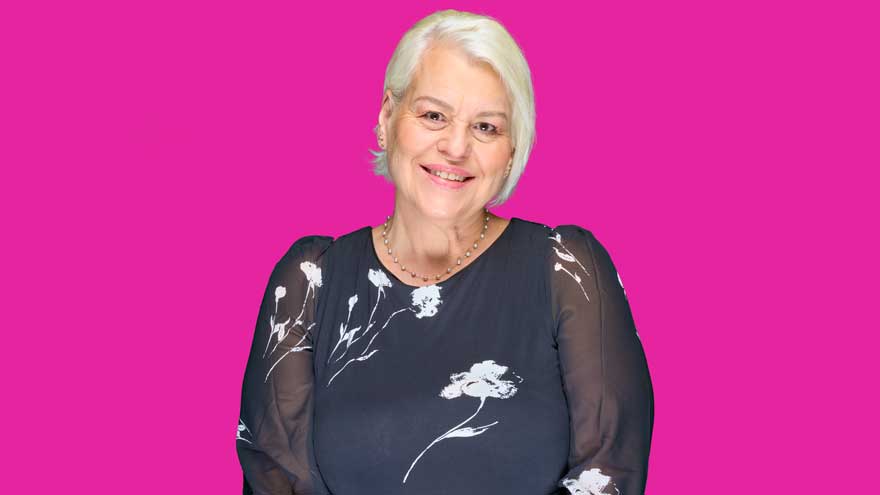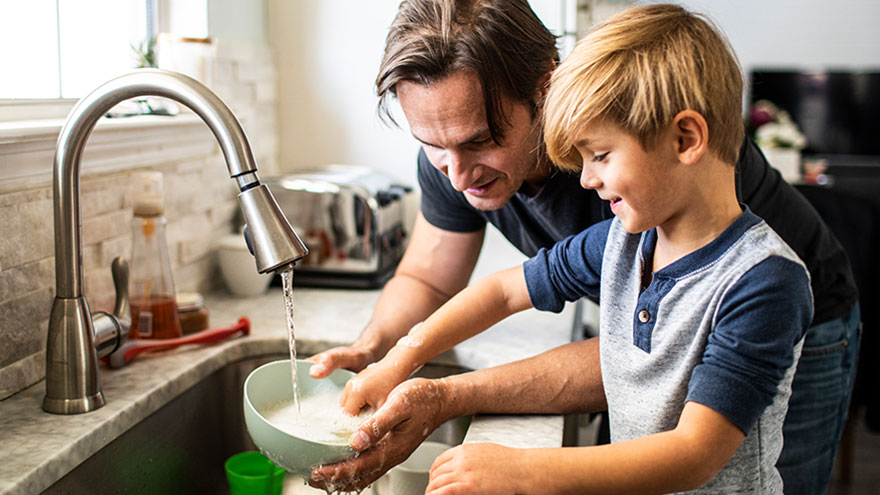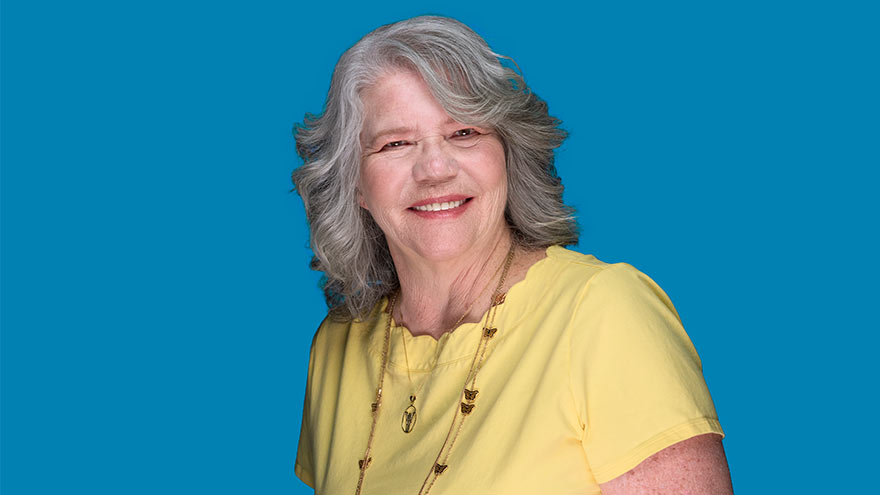Buscar
-
Panda Cares Center of Hope at Renown Children's Hospital
When you have an ill child in the hospital, it is a stressful event. And Panda Express is helping local families support children who need special care. Their generous donation provides much-needed equipment, programs, and resources via the new Panda Cares Center of Hope, Renown Children’s Specialty Center. Their partnership directly benefits patients and their families! The ‘Panda Cares Center of Hope, Renown’s Children’s Specialty Center’ In fact, this new center provides care to not only children, but also comprehensive support to the entire family. Similarly, it creates an environment that reduces stress, promotes healing, and provides a superior patient and family experience. This facility upholds Panda Express’ mission, vision, and values and its four pillars: to directly help fund the emotional, mental, physical, and spiritual needs of children. This center, the first-ever in northern Nevada, will provide care for children who have chronic conditions. In particular, it offers ongoing treatment, health management, and specialty medical services, including: Nephrology Endocrinology Neurology Pulmonary Infectious Diseases Medical Genetics Adolescent Medicine How You Can Help! When you order from Panda Express, you can opt to round up your change, which will help support programs and services, such as the Center of Hope for Renown Children’s Hospital. Order Online A Partnership for Health & Education of Underserved Youth This partnership allows Renown Children’s Hospital to continue to strengthen regional services and increase Panda’s visibility within our growing community. Last year, 21,930 sick children received care from Renown Children’s Hospital. To date, Panda Express has raised $449,200 in financial support to assist us in providing health and education to every child, regardless of illness, injury, insurance, or ability to pay. Panda Express funds have already supported: Giraffe omni beds for the NICU Ultrasound machine for the Children’s ER Panda warmers and a hand held Accuvein machine Child Life Program to support sick patients and families Meeting room in the Children’s Specialty Center In kind donations, volunteer time and support of local events such as the University of Nevada Reno, Wolf Pack Dance Marathon
Read More About Panda Cares Center of Hope at Renown Children's Hospital
-
How to Safely Give Children Over-the-Counter Medications
How can you ensure you’re giving your children safe doses of over-the-counter medications? The safest bet: Confirming dosages and recommendations with your doctor. With that in mind, here are a few answers to basic questions about OTC medications and children. It’s cold and flu season in Northern Nevada. This means you’ll find parents in the aisles of practically every drug store, wondering what will and will not work for their sick children. Over-the-counter (OTC) medications — and their dosages, side effects, interactions and more — can inspire abundant anxiety for parents. At the outset, the U.S. Food and Drug Administration offers the following warning about use of medicines for cough and colds in children: The FDA doesn’t recommend over-the-counter medicines for cough and cold symptoms in children younger than 2 years old. Prescription cough medicines containing codeine or hydrocodone are not indicated for use in children younger than 18 years old. Codeine and hydrocodone are opioids that are available in combination with other medicines, such as antihistamines and decongestants, in prescription medicines to treat cough and symptoms associated with allergies or the common cold for adults. Caregivers should also read labels on OTC cough and cold products, because some might contain codeine. So how can you feel comfortable administering any OTC medication to your children? The short answer is: Check with a doctor first. And with that in mind, here are a few common questions and answers from Kristin L. Wilson, MD, of Renown Pediatrics about children and OTC medications. Please talk about the importance of correct dosage of pediatric medications. Pediatric dosing is weight-based and unique to each medicine (and sometimes even the circumstance you are treating.) Therefore, there are no standardizations of “safe” amounts that apply to all medications. What are signs of an overdose of pediatric medications? Signs of intoxication/overdose are also unique to each medication and supplement. And to make it more confusing, mixing current prescriptions with various supplements or over-the-counter medications can cause significant adverse effects as well. Is there an age at which children take adult over-the-counter medications? Infants through adolescents can take medications that are also prescribed to adults, but only under a healthcare provider’s careful guidance. Dosing is determined by various factors dependent on child’s age and also medical history, as above. What is the takeaway about administering medications to children? When in doubt, ask a healthcare professional whether a medication or supplement is safe for your child based on his/her age and medical history as well as recommended dosing based on recent weights and other vital signs.
Read More About How to Safely Give Children Over-the-Counter Medications
-
Cómo aliviar el miedo de su hijo a las vacunas
Getting a shot can be scary for kids and anxiety-inducing for parents and caregivers. With flu shot season well underway and children's COVID-19 vaccine clinics in full swing, we wanted to share ways to reduce the stress for you and your child. Plan Ahead and Be Honest A few days before the scheduled appointment, casually mention to your child that you’re both going to the doctor’s office (or vaccine clinic, or pharmacy) soon for their vaccine. Explain to them that this will help protect them and will only take a second. Being honest is important, telling your child that it will hurt for a moment. If possible, try and schedule the vaccine at a kid-specific vaccine clinic, your pediatrician's office or a school-based site. Remember that words are powerful. Take notice if you are using a word that might make them more upset, such as prick, jab, needle or shot. You can interchange words such as vaccine, immunization or injection. Bring Toys Don’t be afraid to let your child bring one of their favorite toys or stuffed animals to the appointment. This can make them feel more comfortable and provide distraction. Ask for Pain Reliever/Numbing Agent If you know from past experience (or suspect) that your child has a needle phobia, talk to the vaccination location ahead of time and ask if they can use a pain reliever or numbing agent before administering the vaccine. Distract. Distract. Distract. Sing a song, tell them a joke, make a funny face. If you can pull your child’s attention away from the needle and make them laugh, they won’t focus all their energy on worrying about the shot. Lead By Example If you haven't gotten your flu shot, COVID shot or COVID-19 booster yet, ask the facility ahead of time if you can also get a shot before your child. Show them that the shot is no big deal and that they will have no problem getting it themselves. Celebrate Don’t be afraid to celebrate this victory with your child once it is over – bring them to the park, go out for an ice cream cone, let them pick what’s for dinner. This reward will show that you’re proud of them for being brave and may also make the next time your child is due for a shot easier.
-
Llevando la atención pediátrica cerca de casa
As our community grows, so does the need for specialized care. Thanks to a generous gift, there’s a healthier future for families in the region as a $7.5 million gift to the Renown Health Foundation is helping keep care close to home. Being in the hospital is often a stressful experience, especially for a child and their caregivers. If you add the need to travel out-of-state for care into the mix, unnecessary anxiety and financial burdens can be placed on a family that is already worried about a sick child. With our quickly growing community and close to 100,000 children under the age of 18 in Washoe County alone, the need for local specialty care is needed. The William N. Pennington Foundation recognized this need and donated $7.5 million to the Renown Health Foundation – the largest gift the health system has received – to keep care close to home and establish the William N. Pennington Fund for Advanced Pediatric Care. Thanks to this gift, Renown Children’s Hospital has hired more than 15 pediatric specialists who provide care for children in our community. Below, we introduce you to three key specialized pediatricians in northern Nevada: Joseph A. Gassen, M.D. “Having pediatric specialists in the community is invaluable,” says Joseph A. Gassen, M.D., pediatric emergency medicine. “It allows families and patients to stay in Reno and not have to travel far distances to get quality care.” Gassen, the only doctor specializing in pediatric emergency medicine in the region, moved to Reno to provide care in the emergency room at Renown Children’s Hospital. “The hospital is dedicated to improving the care of children in northern Nevada, and I wanted to be a part of this amazing vision," Dr. Gassen says. I would not have been able to relocate to Reno without the support from the hospital and the William N. Pennington gift.” Working with children and their families are what Dr. Gassen finds most rewarding. "I get to provide care for a child, which in turn makes the parent feel better,” he says. “Essentially, I get to treat the whole family, even though I only directly care for the kids.” Colin Nguyen, M.D. Also among the first new specialists is Pediatric Neurologist Colin Nguyen, M.D., who has done extensive work with epilepsy and epilepsy surgery. “In any growing and expanding community, we need the multitude of social, financial, political and well-being services to sustain that growth and progress,” Dr. Nguyen says. “The ability to offer more breadth of medical services to our local population allows families to spend more time together and fulfill work obligations, without the need to travel long distances to obtain that specialized care.” Dr. Nguyen says he enjoys caring for children because they are honest in their emotions and reactions, as well as simple in their intentions. “It is the overall joy and unique sadness that comes in working with children, which drives many of us to continue our work -- I am no exception.” Jacob Zucker, M.D. The third pediatric specialist providing care thanks to the Pennington gift has close ties to northern Nevada. Jacob Zucker, M.D., pediatric hematologist-oncologist, was born and raised in Reno and attended medical school at the University of Nevada, Reno School of Medicine before moving to the Midwest for his residency and fellowship. Dr. Zucker feels fortunate to have been offered the opportunity to return home and give back to the community that has given so much to him. “I can say with absolute resolve that northern Nevada is an exceptional community to practice medicine in. The care offered here at home is top rate and the providers that live and practice here truly understand the purpose of community.” The addition of these three specialists and the future specialists that will be coming to our area will impact thousands of children and their families. “With a growing population, the vision of leadership at Renown, and with the generosity of the William N. Pennington Foundation, northern Nevada is in position for the first time to make local pediatric subspecialty care a reality and to keep our families at home in their community,” Dr. Zucker says.
-
What Is the Role of a Child Life Specialist?
What is the role of the child life specialist? Here are common questions and answers about how these special individuals give both parents and kids peace of mind. Let’s face it: A hospital can be an intimidating place for just about anyone. But add in being a small human with very little worldly experience — aka a child — and it’s easy to imagine how overwhelming a hospital visit can be. Enter the role of the child life specialist. Liz Winkler, a child life specialist with Renown Children’s Hospital, explains how a Renown program puts young patients and their families at ease. What does a child life specialist do? Child life specialists help young patients develop ways to cope with the anxiety, fear and separation that often accompany the hospital experience. They give special consideration to each child’s family, culture and stage of development. As professionals trained to work with children in medical settings, specialists hold a bachelor’s or master’s degree in the areas of child life, child development and special education or recreational therapy. Our child life specialists are also professionally certified and affiliated with the national Child Life Council. Child life specialists also offer tours of Renown Children’s Hospital for families whose children are scheduled to have surgery. Child life supports children and families by: Helping children cope with anxiety, fear, separation and adjustment Making doctors, needles and tests a little less scary Providing art, music and pet therapy Organizing activities Addressing your concerns Telling you what to expect Creating a therapeutic and medical plan Offering a hand to hold What else is available at the Children’s Hospital that helps ease some of the stress of a hospital visit? Whether it’s seeing a pediatrician, getting a sports physical or looking for advice, our care is centered on supporting and nurturing patients and families at our many locations. We have kid-friendly environments to help ease some of the stress of a hospital visit. These include colorful exam rooms, kid-friendly waiting and common areas, and medical equipment designed especially for children. Our children’s ER is open 24 hours a day, seven days a week. So parents and caregivers have access to emergency care tailored to little ones — anytime, day or night. We have several pediatric specialists on the Renown team in areas including diabetes, emergency medicine, neurology, pulmonology, blood diseases and cancer. How can parents start to ease their children’s mind when they know a hospital visit is in the future? As with many things in life, good preparation can help kids feel less anxious about the experience and even get through recovery faster. It’s important to provide information at your child’s level of understanding, while correcting any misunderstandings, and helping to eliminate fears and feelings of guilt. If you’re anxious and nervous, your child may reflect these feelings and behaviors. So make sure you educate yourself, feel comfortable with the process, and get your questions answered.
Read More About What Is the Role of a Child Life Specialist?
-
Sterling Silver Club Member Masterpiece
A Gallery-Worthy Member Artistry usually refers to a person’s ability to express their unique creativity in powerful and surprising ways. But there is also an art to living your life in ways that celebrate who you are, your limitless potential, the people you love and the community you care about. So imagine our delight to discover a Sterling Silver Club member and artist whose artistry of life reaches far beyond gallery walls. An Early Love of Art Born in Chicago, Illinois, Debbie arrived as the last of her parents’ three children and has two older siblings, Cynthia and Henry (a.k.a. Skip). As is usually the case, school played an important role in their shared childhood and Debbie remembers being drawn to art assignments in class from an early age. “When I was a young girl, I loved working on various art projects at school,” she recalls. “I always found myself learning something new and then teaching it to everyone I knew.” Later, Debbie would play violin in the school orchestra, join the swim team, and to continue to learn about art and its broader influence. “I remember taking a class and learning about color theory,” recounts Debbie. “I was so impressed with how colors relate to one another and also discovered how primary and secondary colors can be used together to make everything from products and advertising to what we wear more pleasing to the eye.” Expression-ism. “Art allows you to express yourself,” says Debbie. “And I’ve always been quite happy being expressive.” Though Debbie’s affinity for art was obvious, it wasn’t destined to be her career… at least initially. After earning degrees in marketing and public relations at North Central College in Naperville, Illinois and George Williams College of Aurora University in Williams Bay, Wisconsin, respectively, Debbie began what turned out to be a career in technology. In the Chicago area, she held positions as a systems analyst and computer programmer and a role in marketing and public relations for a computer software company. Then it was off to Los Angeles, California with her new husband, David, where she worked in sales and education for another software company. The couple returned to Elmhurst, Illinois to start their family but eventually moved to and settled in Minden, Nevada where David had an insurance business for 23 years and their children grew to become the adults their grandparents dreamed of. “My mom and dad would be most proud of our children,” beams Debbie. “They (her parents) always hoped for the best for them and would be over the moon that they are doing what they want to do, two of them in the field of medicine.” Debbie and David now live in Carson City, Nevada and their three children have established lives of their own. Jeffrey, the oldest, is a pastor and holds two master’s degrees. Rachael is an OB/GYN provider in Southern California and a graduate of University of Nevada, Reno School of Medicine (UNR Med). And their youngest, John-Henry, is finishing up his medical training and will soon be a trauma surgeon. Furry Family Members Debbie’s other “kids” are of the four-legged variety. “Mercedes and Bentley are really our luxury pugs,” she admits. “But are named after famous characters from books, not luxury cars.” She also says they are goofy, much-loved and simply melt the hearts of everyone they meet – “always!”
-
Meet Multifaceted Member Don Chang
Renaissance Don The Sterling Silver Club is honored to have thousands of members who’ve led and continue to lead incredibly vibrant and diverse lives. And we’re absolutely thrilled when those members volunteer to share their stories and experiences so we can all appreciate and learn from them. This issue’s featured member is no exception. From his love of cooking, travel and music to his drive to learn new languages, take on new hobbies and keep himself active and fit, Don is an aspiring Renaissance man who may already be deserving of the title. Revolutionary Family Roots Don’s father, who was born in Beijing, China, earned a master’s degree in metallurgical engineering from the University of California, Berkeley and was working on his PhD there on a full scholarship from his home country when the Chinese Communist Revolution occurred. In order to stay in the United States and avoid potentially being thrown into prison by the new communist regime (a fate that befell some of his family members), his father married Don’s mother, who was a U.S. citizen and also a student at Berkeley. Together, they started a family. “My father met my mother in a class and received his green card by marrying her,” says Don. “They proceeded to have six kids in nine years, I was number three. Dad never finished his PhD, but clearly earned what we like to call his “PSK” degree – Papa with Six Kids.” Proud (of) Papa: Don’s father was a professor of metallurgy and a brilliant research scientist who was responsible for virtually every breakthrough in the development of titanium in the 1960s.
-
¡Adiós a las fiestas, hola a las rutinas! Hacer que los niños retomen el ritmo cotidiano
The kids are back in school and the holidays are all but a distant memory: Now what? Karen Wagner, APRN, offers specific tips about getting kids back to their routines in the post-holiday-hustle-and-bustle. Are you finding the kids struggling with bedtime routines? Having trouble getting them to tackle homework? There’s a simple reason: The holidays messed with their mojo! Here, we talk with Nurse Practitioner Karen Wagner about what to do to get them back on the straight and narrow. Why Routines Are Important “Holidays are a fantastic time to get together with family and friends, so our routines are usually off — and this is understandable, “Wagner says. “While the holidays are exciting, they are chaotic and can put our kids out of the routines.” So how do you get kids back into those routines they crave? “Consistency/routines are crucial for our kids,” she says. “Most people — kids and adults — experience a let-down feeling after the holidays, and post-holiday adjustment takes time.” So what can we do, specifically? Wagner recommends the following: Re-establish family routines, including before- and after-school programs or child care routines. Once kids are back on the regular schedule, they’ll find that sense of familiarity as the old routine returns. But keep in mind, this won’t happen overnight. Encourage healthy eating, as the upheaval of their schedule can be offset by a balanced diet. Make sleep time a priority: Keep in mind that it might take up to three nights of strict bedtime to get them back on track. But enforcing normal bedtime will get their bodies back on a normal schedule. Return to usual chores and expectations. Nothing encourages a return to routine like reminding them of the basics. Incorporate indoor and outdoor time. They likely spent lots of time outdoors during our unseasonably warm winter break — and they even had a snow day or two! So encouraging both indoor and outdoor time will help them return to a circadian rhythm and tire them out from exposure to fresh air. “It is never too early to encourage a love for physical activity in kids by exposing them to fun fitness activities and sports,” Wagner says. “Physical activity improves bone health, cardiorespiratory and muscular fitness, decreases levels of body fat, reduces symptoms of depression, and improves cognitive skills and the ability to concentrate.”
Read More About Bye-Bye Holidays, Hello Routines! Getting Kids Back into the Groove
-
Una pareja fuerte como las rocas
Renown’s Sterling Silver Club is honored to feature members of our club each season. We thank Mary and Dave for sharing their fun-loving story and all of our members for leading healthy, happy lives that inspire us all. Rock On! Rhyolite almost sounds like a rock band, but it’s not (at least not one that we are aware of). It is a ghost town near the eastern boundary of Death Valley National Park, the most silica-rich of volcanic rock – and the magma-based spark for what has become a very special relationship of our featured Sterling Silver Club member couple, Mary and Dave. “May I carry those for you?” Mary and Dave first met back in January of 2015 when they sat near each other at a financial seminar in Reno. Though friendly banter was exchanged at the time, contact information was not. It wasn’t until later that year in July when “rock karma” intervened. The two reunited unexpectedly when they joined friends on an excursion to Wonder Mountain near Fallon, Nevada to gather… Rhyolite! “I remember I enjoyed meeting Mary at the seminar and thought she was pretty, but didn’t get her phone number,” recalls Dave. “But that day in the desert, Dave asked if he could carry my rocks,” Mary smiles, “and we got each other’s numbers and began dating after that.” Since then, they’ve gone “rockhounding” all over the state. Smokey quartz brought them to Mt. Peterson, north of Reno. Daisy agates were worth a trip to Austin, Nevada. They’ve hunted for Larsonite, a rare, petrified bog wood found only in McDermott, and also venture out with the Comstock Gold Prospectors Club in search of that precious metal. Hiking, exploring and searching for interesting and colorful “finds” together make rock hunting one of the couple’s favorite hobbies. “I’m especially fascinated with petrified wood that’s been lying in the desert for millions of years until I dig it up,” says Dave. “Pretty cool!” The Pre-Rock Years Mary and her four siblings are first generation Chinese Americans. Her parents who emigrated from Malaysia to the U.S. by way of Canada after World War II and raised the family in Northern Virginia. After earning a bachelor’s degree from the College of William and Mary, our Mary started a career in software training and project management. Now retired, she occasionally goes to work helping friends and family with travel reservations. Dave and his three siblings were born and raised in Southern California. He remembers his parents taking the family camping in the Sierra Nevada mountains a couple times a year and trips out to the sand dunes in San Filipe, Mexico where they’d stay for weeks at a time. Dave began his career in the restaurant industry right out of high school and was eventually recruited to run a developer’s hotel restaurant and be his personal chef. Dave wrapped up his career in 2012 when he stepped down as executive chef at Circus Circus Reno Hotel & Casino. More recently on the non-work front, Dave’s son, Cameron, and his wife, Rebecca, have blessed grandpa Dave with a granddaughter, Madison – and there’s a grandson on the way! Getting to Know You Mary and Dave also use their time to collect travel experiences that have allowed their relationship to deepen and their appreciation of each other to grow. They’ve camped at Death Valley and locations throughout the Nevada desert and admit to more civilized stays in hotels and resorts in Ireland, Mexico, Portugal, Spain and the United States. They also spend a week every fall paddling their canoe along the shores of Lake Tahoe, which they call the most beautiful place in the world. Well, when you travel that much with someone, you really get to know them. “Mary has the clever wit to keep things interesting,” says Dave. “Plus she has the patience to put up with my little quirks and idiosyncrasies, and the gumption to keep me out of trouble!” And Dave’s cooking skills have found a fan in Mary, who’s a bit of a cook herself. “My favorite dish of his is roast duck,” says Mary. “I offered a little coaching and showed him the traditional way of serving it with steamed rice pancakes, hoisin sauce and spring onions.” Mary also enjoys spending time bulldog spotting, restoring her 1992 Mazda Miata, playing the ukulele, crocheting and knitting – and she’s teaching herself Spanish! Member-to-Member Advice Mary and Dave enjoy socializing with other Sterling Silver Club members and learning how to better care for their health at different club events. As for their advice to other members? That’s simple: “Live the best life you can by taking care of yourself and your family and friends.” The Sterling Silver Club thanks Mary and Dave for giving us a glimpse inside their ROCKIN’ relationship and appreciates all of our members for being passionate about living their best lives.
-
Un miembro del Club con una gran anécdota
Renown’s Sterling Silver Club is honored to feature one of our more than 9,000 members each season. We thank Judith for sharing her inspirational story and all of our members for leading healthy, happy lives that inspire us all. Mother, grandmother and eventually great-grandmother is the expected title progression as families grow and babies have babies. “Grand” and “great” usually imply roles and responsibilities have shifted from daily child-rearing duties to those of a doting grandparent – that is, unless you decide to do it all over again. At the age of 61, that’s exactly what featured Sterling Silver Club member, Judith, decided to do when she adopted four of her great-grandchildren. At the time, Alicia, Adrianna and Joey were all under five and Giancarlo, the youngest, was just a baby. “At the adoption hearing, the judge was concerned how stressful it would be for me to raise four children in my late 70s and early 80s,” recalls Judith. “But I told him I had raised my own four children and then three grandchildren for a number of years and that it would be far more stressful for me to have my great-grandchildren separated from each other and me, possibly forever. I knew I could handle the stress of raising them no matter my age, but I couldn’t survive the stress of losing them.” “That was when Giancarlo started getting fidgety,” she continues. “So I raised up his little shirt and blew a raspberry on his tummy which made him giggle and settle down. Seeing that, the judge told the recorder to “put that move in the record” and agreed I was capable of caring for my little ones.” Years later, Judith has come to realize that her great-grandchildren also want to be there to care for her. “Giancarlo always makes me smile,” says Judith. “Once during a stay in the hospital, I was awoken at 3 a.m. for blood work and found him sitting next to my bed watching the oxygen count – he was 10 years old at the time.” “The nurse asked him why he was awake and he said he heard her say the count shouldn’t go below 88, so he was watching to save me if it did,” Judith explains. “The nurse reassured him that she was also watching the count at her desk and he didn’t need to worry. Then Giancarlo looked her square in the eye and told her if it went below 88 to wake him up because he loved me and didn’t want to lose me.” “He is still my sunshine,” Judith smiles. “And I have never regretted my decision.” Work & Play For 20 years, Judith worked at Truckee Meadows Community College (TMCC), first as an administrative assistant for the police academy before moving to a position in the president’s office. There she worked with the TMCC Foundation and on TMCC projects to raise capital funds for new buildings, off-site campuses, scholarships, college programs and more. “It felt wonderful to be able to notify a student that they had received a scholarship or tell a department that they had received the funds to purchase needed equipment for their program,” recalls Judith. For fun these days, Judith still enjoys doing something she did as a teenager: playing pool. “My mother taught me to play pool in my dad’s pool room/teen hangout space in my early 20s and I’m just getting back into the game by taking lessons to help remind me what I was taught,” says Judith. “I grew up in a small, country town on the Ohio River and my mother could beat almost all of the boys in the county. I would love to be able to emulate her ability in the game.” Judith also enjoys reading, watching Hallmark movies or Warriors basketball games, walking in nature, playing “competitive” shuffleboard with friends, all genres of music – and dancing! In fact, she’s currently taking dance lessons to learn a few new steps. Always Good for a Laugh “My great-grandchildren and I laugh a lot when I try to teach them the stroll, twist, mashed potato and old-fashioned, rock-‘n’-roll dancing,” admits Judith. “But we laugh even harder when they try to teach me their dance moves!” Faith in What Matters Faith is something Judith celebrates and embraces for herself and others. “I truly believe that we are placed on earth exactly where God feels we are needed and that we are here to help each other through life, not to accumulate material goods for ourselves,” says Judith. “I feel deep satisfaction when I can help others either through just listening to them, advising them, helping them with specific needs or simply giving a smile to a stranger. To me, giving a smile or a helping hand to someone is like skipping a rock across the water – the ripples go on and on.” Then she adds, “And raising my great-grandchildren to be able to have wonderful lives full of love and happiness and closeness to God is the greatest gift I could give them.” Club Talk So what does Judith appreciate most about being a member of the Sterling Silver Club? She says it’s the opportunity to just – talk. “I fully enjoyed my initial interaction with the club and other club members at the Roaring Twenties dinner dance event,” remembers Judith. “I sat at a table with the nicest ladies and had great conversations with adults and danced with one of the instructors. When you are raising four teenagers who sometimes seem to speak an entirely different language, it’s refreshing to meet and speak with others your own age.” Pictures of some of the popular Sterling Silver Club events are featured here. Judith finds club events that bring her joy. “I also like the cooking classes and recently went on a walking tour of Oxbow Park, which was very peaceful.” What advice does Judith have to help other members live their best and fullest lives? “On a wet December morning 50 years ago,” Judith begins, “a truck coming around a curve on a country road slid into me and that split second could have made all the difference in the world to me. But God was with me and I survived, which no one expected.” “You never know when that one second that could change everything might happen, so make the most of all of your seconds,” she advises. “Do what you love with those you love. My family means the world to me and I try to think about how my decisions will reflect on the memory I will leave behind for them.” Then Judith thoughtfully adds, “I want them to remember that I truly loved them and always did my best to let them know that.”
-
Padres, sus hijos necesitan vacunas contra la gripe. Este es el por qué
Vanessa Slots, MD, of Renown Medical Group – Pediatrics, explains why getting a flu shot each season can save lives—especially true for the very young and elderly. Why Kids Need Flu Shots The flu is not a passing cold. It is a serious illness that takes lives every year. And this year, flu activity is increasing late in the season. And it happens like clockwork — the onset of an influenza epidemic as fall transitions into winter, and lasts into the spring months. This acute respiratory illness is caused by influenza A or B viruses with yearly outbreaks occurring worldwide. No one is immune, and everyone is susceptible to the flu. Flu Signs and Symptoms: Abrupt onset of fever Headache Body aches and fatigue along with respiratory-tract symptoms including cough Sore throat and an irritated nose Who’s at Risk? Once again: Everyone is susceptible, but children and the elderly are at greater risk of complication from influenza, specifically toddlers less than 2 years. At this age, immunities are underdeveloped. Seniors over 65 are also at increased risk because their immune systems have weakened with age. The severity of a child’s symptoms depend on age and prior exposure to the virus. And with young children, flu is more problematic, since they cannot verbalize certain symptoms like body aches and headaches. As a result, children often experience higher fevers, which can lead to seizures or convulsions. Coupled with gastrointestinal issues such as nausea, vomiting, diarrhea and poor appetite, children are at risk of dehydration and other complications from the virus that can require hospitalization. In fact, an average of 20,000 children are hospitalized from flu each year. Pre-Existing Health Issues Health conditions, including but not limited to asthma, cystic fibrosis, heart conditions, cerebral palsy, epilepsy or diabetes, can intensify flu symptoms. Still, a substantial number of children with none of these risk factors experience severe complications from the flu. How to Protect Your Child from the Flu The best way to guard against influenza is with a flu shot. Children and adults should get the flu vaccine before flu season kicks in — usually by the end of October. Shots are provided as long as flu viruses are circulating and the vaccine is in supply.
Read More About Parents, Your Kids Need Flu Shots. Here's Why.
-
Top Safe Sleep Tips for Your Baby
Becoming a parent for the first time means lots of new unknowns – from learning to breastfeed and swaddle to buckling your newborn into the car seat for the first time. But when it comes to putting them to bed safely, it’s important to remember it really can mean life or death. It’s something we’re taught before our little one is even here: the correct way to put your baby to bed safely. Sadly though, the number of infant deaths continues to climb. The main culprit of sleep-related infant death continues to be all the items parents leave in the crib with their babies. According to the Center for Disease Control and Prevention, there are about 3,500 sleep-related deaths among babies each year. “The best advice is ‘bare is best.’ Keep your infant’s sleep space clutter free – no blankets, bumpers, toys or pillows,” said Karen Wagner, Pediatric Nurse Practitioner. Follow the ABCs for Safe Sleep Remembering the ABCs is an easy way to remember how to put your little one to bed safely. A: Alone No blankets, toys or pillows. “We do recommend using a sleep sack as a blanket alternative,” said Karen. “It prevents the risk of suffocation and keeps your baby warm.” Keep in mind, the greatest risk for suffocation happens when babies are under 1 year of age, so it’s best to save the toys, blankets and pillows for their “big kid bed,” or around 18 months old. B: Back The slogan “back is best” is another good reminder. Keeping your baby on their back until they’re old enough to rollover helps reduce the risk of Sudden Infant Death Syndrome (SIDS). C: Crib It is best to have your baby sleep alone in their crib. While co-sleeping may be enticing, especially after a late-night feed, it increases the risks of possible suffocation. However, “having your child in your room, in their own crib or bassinet, is protective for SIDS,” Karen said. “In fact, we think co-rooming reduces SIDS risk by almost 50 percent.” Co-rooming allows parents to keep new babies in close reach and helps parents oversee their baby’s sleep, just in case something happens.
